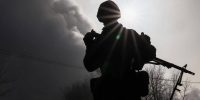
Tokayev faces double challenge in a troubled Kazakhstan
In early January Kazakhstan was rocked by three cascading events: legitimate anti-government protest against three decades of corruption and ineffective governance under Kazakhstan’s long-time leader Nursultan Nazarbayev; an attempted palace coup; and an armed insurrection led by well-trained mercenaries on the streets of Almaty, Kazakhstan’s commercial capital.
On 2 January, a small demonstration over fuel prices triggered a nationwide protest movement which raged against three decades of rule which did not serve the interests of the people, but rather the ruling elite and its allies. The calls of ‘old man out’ were conspicuously directed at President Kassym-Jomart Tokayev’s predecessor Nazarbayev, who still retains control of much of Kazakhstan’s political economy.… Seguir leyendo »






